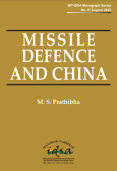The US Factor in Sino-Indian Relations: India’s Fine Balancing
The monograph seeks to determine the extent to which the US is a factor as an intervening variable in the complex relationship between the two countries. The study attempts to probe the research question as to how China perceives U.S policy towards India in particular, and whether growing Indo-US ties can affect China's security interest negatively.
Transforming India-Taiwan Relations : New Perspectives
Strengthening people-to-people relations is the best way forward for enhancing India-Taiwan relations. The normalisation in the Cross-Strait relations provides an opportunity for India and Taiwan to further deepen their functional ties.In keeping with these ideas, this monograph presents a broad roadmap by retelling the forgotten stories of the past and providing a base for discussing the present and the future.
National Interests and Threat Perceptions: Exploring the Chinese Discourse
The purpose of this study is to review the conceptualization and debates within China on its national interests and the threats perceived to these. It is hoped that an insight into how Chinese scholars and leaders view the current situation in their country and the world will help to better understand the motivations and constraints that China may face in formulating its policies – both domestic and foreign.
India-China Relations: A New Paradigm
India-China relations may not be ideal in the narrative of a bilateral relationship between the countries. But given the complexity of the engagement and interaction between the two countries and taking into account the divergent political systems, the unresolved territorial issues, compulsions of geo-politics, the quest for resources and markets, and aspirations of the two countries for global influence and power, the relations between the two countries are certainly a matter of reassurance and optimism.
China’s Perception of ‘Look East Policy’ and Its Implications
The monograph explores China's perception of India's Look East Policy (LEP) and how that affects India's strategy in the Asia-Pacific region. Beijing does not favour a strong Indian presence and influence in Southeast Asia. China is both a determinant and a constraint in India's Look East Policy.
BRICS and the China-India Construct: A New World Order In Making?
The monograph portrays to understand and contribute to the strategic analyses of foreign, security and economic policy issues that are attached to the rise of BRICS. This is not only a study about BRICS per se; but is also about China and India, the two most vital powers of this grouping. This study has been written in Indian context, and has tried to delve into the China-India course within BRICS.











